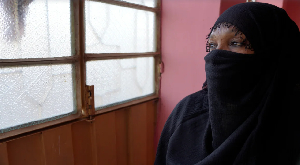President of the National Association of Graduate Teachers (NAGRAT), Angel Carbonu, has indicated that implementing the new educational curriculum will be "fanfare" for the schools in the country.
Speaking on Joy News’ PM Express, Mr Carbonu could not indicate whether the Ghana Education Service (GES) is ready in implementing the new curriculum.
He said there are challenges but “We can have a beautifully written curriculum like we have but when the infrastructure, the facilities, the environment is not adequately available which is the case now, all that we will be doing is a fanfare.”
Mr Carbonu questioned whether there is a required standard for a place to be called a school. To him, a place being described as a school should have a required standard so when any ‘school’ falls below the required standard, it should be closed down.
“If you fall within the required standard, we maintain you. Then when we have that required environment that we can call a place a school then we can implement your curriculum and ensure that you get results out of the curriculum,” he explained.
“When you have teacher A and B in different environments, where one environment is likely endowed and the other environment is deficient in meeting the standards, how then will you be able to judge me and say that I have not applied the curriculum the way you want me to apply,” he added.
Mr Angel Carbonu further emphasized that there should be an established standard class size based on knowledge and research because a large class size will have difficulty in interactive teaching and learning.
Background
The Director-General of the Ghana Education Service, Professor Kwasi Opoku-Amankwa, on Thursday, April 11, launched the New Basic Curriculum as part of ongoing reforms in the sector. Prof. Opoku-Amankwaah said, the Education Ministry is embarking on the reforms, particularly at the pre-tertiary level, to make education more responsive to the human resource and development needs of Ghana. Below are the key features of the newly-introduced reforms which will take effect at the start of the new academic calendar in September. THE NEW PRIMARYCURRICULUM: KEY FEATURES Under the new curriculum, the following important features must be noted; 1. At KG, the number of learning areas is to be reduced from seven (7) to four (4) which are integrated into themes. However, these will be treated with more depth. 2. At Lower and Upper Primary, the number of subjects remains the same. However, there will be fewer concepts and more in-depth treatment of concept in each subject. Further, there is greater emphasis on literacy and numeracy. 3. Introduction of standards-based curriculum. This means that at every stage in school, a student is expected to demonstrate an understanding and mastery of knowledge and skills that they are expected to learn as they progress through their education. 4. There will be national assessments at P2, P4 and P6 to ensure that children’s performance is being tracked. 5. History of Ghana will be compulsory for each child from P1 to P6. 6. RME will be a standalone subject. 7. PE will be a standalone subject and will be taught practically 8. French will be introduced at Upper Primary Plan for Nationwide Implementation 1. Training a core of 150 master trainers nationwide on the new curriculum. 2. The master trainers will in turn train 3,900 district and regional trainers.
3. About 152,000 KG and primary school teachers will be trained across the country by the master, regional and district trainers. 4. There will be continuous professional development through the setting up of learning communities for teachers to enable them share ideas and experiences. 5. Community engagement (School Management Committees (SMCs), School Performance Appraisal Meetings (SPAM), PTA), supply of curriculum documents to schools, supply of textbooks, relevant teaching-learning resources, monitoring and evaluation.
General News of Wednesday, 21 August 2019
Source: www.ghanaweb.com

















